新概念2-Lesson-41-教案(汇编)
- 格式:doc
- 大小:57.50 KB
- 文档页数:8
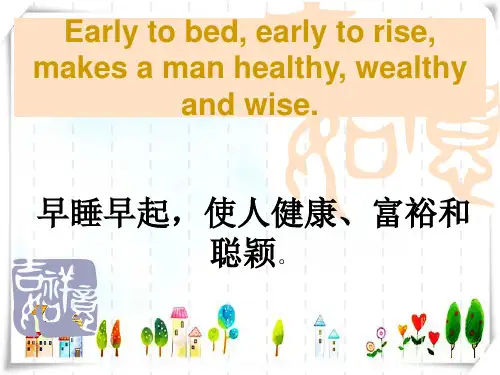
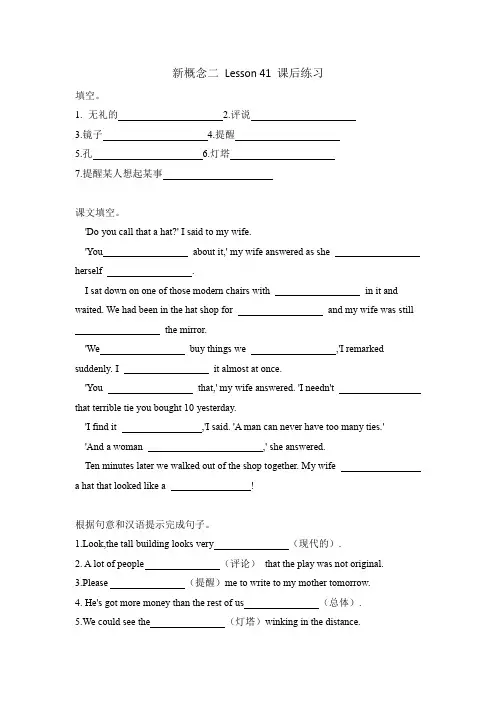
新概念二Lesson 41 课后练习填空。
1.无礼的2.评说3.镜子4.提醒5.孔6.灯塔7.提醒某人想起某事课文填空。
'Do you call that a hat?' I said to my wife.'You about it,' my wife answered as sheherself .I sat down on one of those modern chairs with in it and waited. We had been in the hat shop for and my wife was stillthe mirror.'We buy things we ,'I remarked suddenly. I it almost at once.'You that,' my wife answered. 'I needn'tthat terrible tie you bought 10 yesterday.'I find it ,'I said. 'A man can never have too many ties.''And a woman ,' she answered.Ten minutes later we walked out of the shop together. My wifea hat that looked like a !根据句意和汉语提示完成句子。
1.Look,the tall building looks very (现代的).2. A lot of people(评论)that the play was not original.3.Please(提醒)me to write to my mother tomorrow.4. He's got more money than the rest of us (总体).5.We could see the (灯塔)winking in the distance.根据句意,用方框内所给单词的适当形式填空。
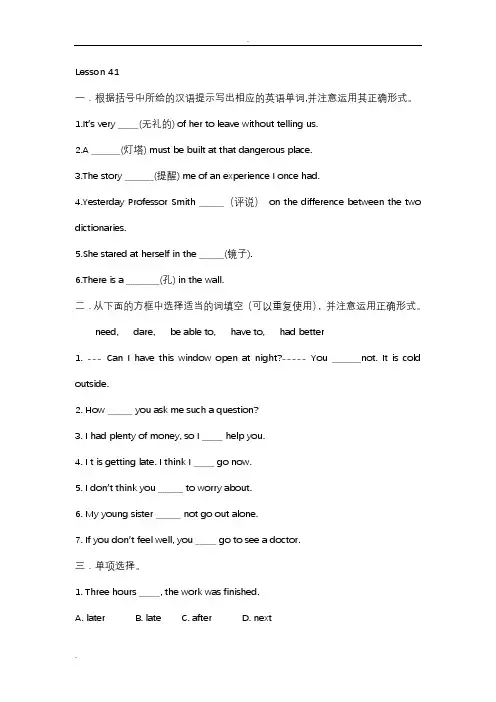
Lesson 41一.根据括号中所给的汉语提示写出相应的英语单词,并注意运用其正确形式。
1.It’s very _____(无礼的) of her to leave without telling us.2.A _______(灯塔) must be built at that dangerous place.3.The story _______(提醒) me of an experience I once had.4.Yesterday Professor Smith ______(评说)on the difference between the two dictionaries.5.She stared at herself in the ______(镜子).6.There is a ________(孔) in the wall.二.从下面的方框中选择适当的词填空(可以重复使用),并注意运用正确形式。
need, dare, be able to, have to, had better1. --- Can I have this window open at night?----- You _______not. It is cold outside.2. How ______ you ask me such a question?3. I had plenty of money, so I _____ help you.4. I t is getting late. I think I _____ go now.5. I don’t think you ______ to worry about.6. My young sister ______ not go out alone.7. If you don’t feel well, you _____ go to see a doctor.三.单项选择。
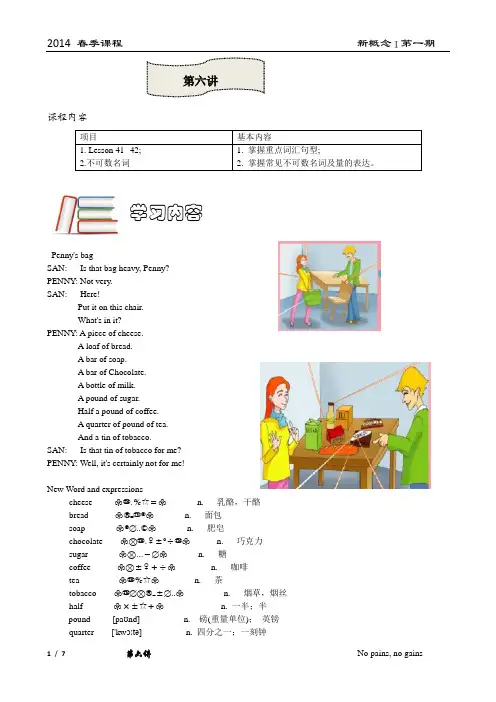
课程内容Penny's bagSAN: Is that bag heavy, Penny?PENNY: Not very.SAN: Here!Put it on this chair.What's in it?PENNY: A piece of cheese.A loaf of bread.A bar of soap.A bar of Chocolate.A bottle of milk.A pound of sugar.Half a pound of coffee.A quarter of pound of tea.And a tin of tobacco.SAN: Is that tin of tobacco for me?PENNY: Well, it's certainly not for me!New Word and expressionscheese n. 乳酪,干酪bread n. 面包soap n. 肥皂chocolate n. 巧克力sugar n. 糖coffee n. 咖啡tea n. 茶tobacco n. 烟草,烟丝half n. 一半;半pound [pa ʊnd]n.磅(重量单位); 英镑quarter ['kw ɔːt ə] n. 四分之一;一刻钟学习内容The key points:ⅠⅠⅡ不可数名词:cheese, bread, soap, chocolate, milk, sugar, coffee, tea, tobacco(1):不可数名词前面不能加a或an,也没有复数形式;(2):some / any 可修饰不可数名词;eg. There is some cheese on the plate.Is there any milk in the bottle ?There isn’t any coffee in the cup.(3): 不可数名词量的表达:a piece of 一张(片、块) a piece of paper two pieces of papera piece of bread two pieces of breada loaf ofa bar ofa pound ofa kilo of用某种容器表示量a glass of a glass of milk three glasses of milka bottle of a bottle of water four bottles of watera cup of【巩固练习】1. 在桌子上有两杯咖啡。
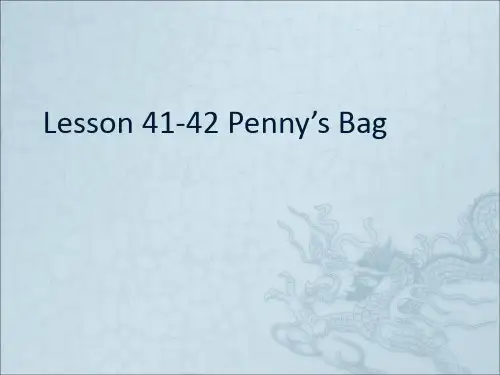
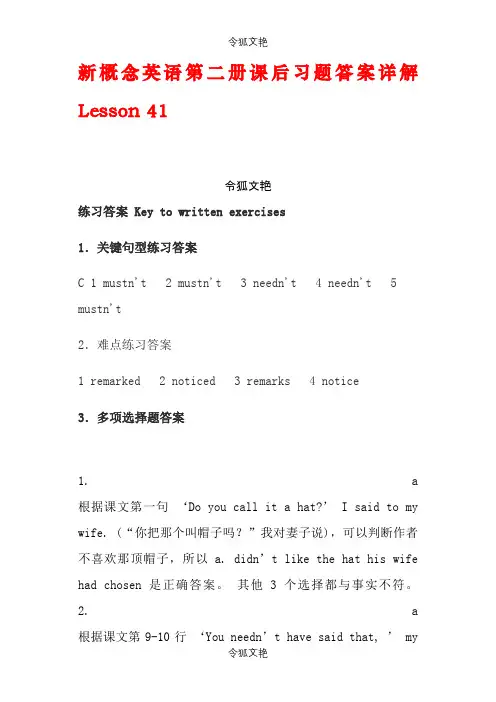
新概念英语第二册课后习题答案详解Lesson 41令狐文艳练习答案 Key to written exercises1.关键句型练习答案C 1 mustn't 2 mustn't 3 needn't 4 needn't 5 mustn't2.难点练习答案1 remarked2 noticed3 remarks4 notice3.多项选择题答案1. a 根据课文第一句‘Do you call it a hat?’ I said to my wife. (“你把那个叫帽子吗?”我对妻子说),可以判断作者不喜欢那顶帽子,所以 a. didn’t like the hat his wife had chosen 是正确答案。
其他3个选择都与事实不符。
2. a 根据课文第9-10行‘You needn’t have said that, ’ mywife answered. ‘I needn’t remind you of that terrible tie you bought yesterday’, 可以判断只有 a. his wife reminded him that he had bought a terrible tie 与课文的实际情况相符,是作者为对他妻子粗鲁讲话而后悔的原因,其他3个选择都与事实不符,也不合乎逻辑。
3. ca. mustn't (不应该);b. wont(不想要);c. needn't(不必);d. don't need(不需要)4个选择中只有 c. needn't 与后面一句It isn't necessary(没必要)的含义相同,所以选c.4. da. still 和 d. yet 都有“还,仍然”的含义,但yet只能用于否定和疑问句中,表示“还没……”,still常用于肯定句中。
前面一句是肯定句,用了still,本句是完成时态的否定句,因此只能选 d.b. even(甚至),c. also(也)都不合乎题目意思和语法。
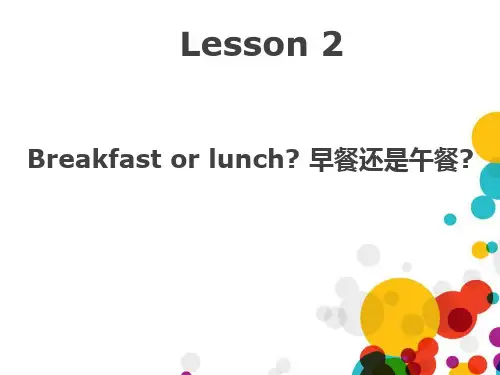
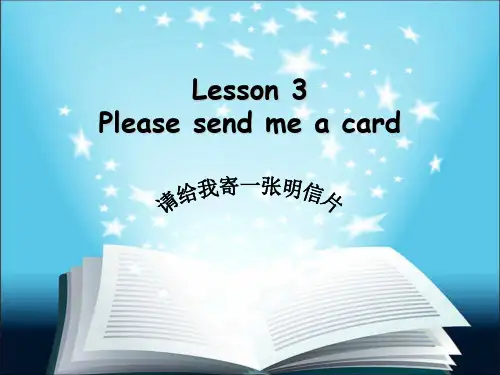
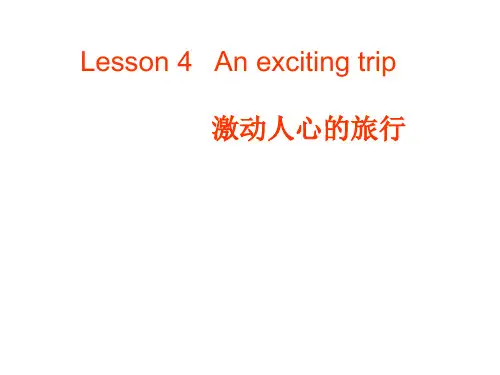
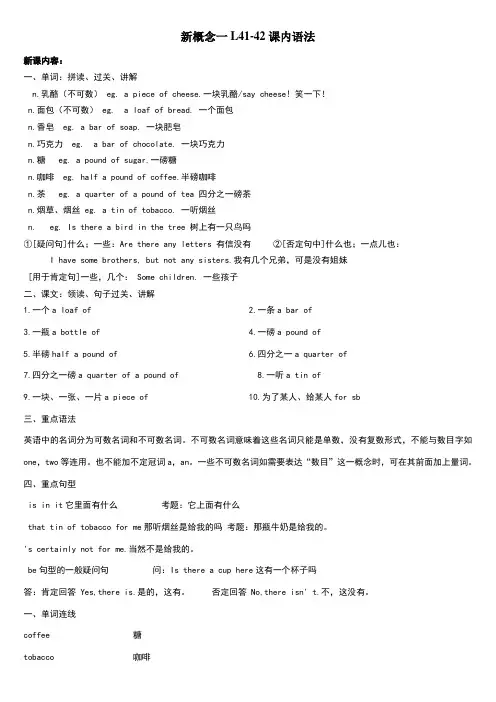
新概念一L41-42课内语法新课内容:一、单词:拼读、过关、讲解n.乳酪(不可数) eg. a piece of cheese.一块乳酪/say cheese! 笑一下!n.面包(不可数) eg. a loaf of bread. 一个面包n.香皂 eg. a bar of soap. 一块肥皂n.巧克力 eg. a bar of chocolate. 一块巧克力n.糖 eg. a pound of sugar.一磅糖n.咖啡 eg. half a pound of coffee.半磅咖啡n.茶 eg. a quarter of a pound of tea 四分之一磅茶n.烟草、烟丝 eg. a tin of tobacco. 一听烟丝n. eg. Is there a bird in the tree 树上有一只鸟吗①[疑问句]什么;一些:Are there any letters 有信没有②[否定句中]什么也;一点儿也:I have some brothers, but not any sisters.我有几个兄弟,可是没有姐妹[用于肯定句]一些,几个: Some children. 一些孩子二、课文:领读、句子过关、讲解1.一个a loaf of2.一条a bar of3.一瓶a bottle of4.一磅a pound of5.半磅half a pound of6.四分之一a quarter of7.四分之一磅a quarter of a pound of 8.一听a tin of9.一块、一张、一片a piece of 10.为了某人、给某人for sb三、重点语法英语中的名词分为可数名词和不可数名词。
不可数名词意味着这些名词只能是单数,没有复数形式,不能与数目字如one,two等连用。
也不能加不定冠词a,an。
一些不可数名词如需要表达“数目”这一概念时,可在其前面加上量词。
四、重点句型is in it它里面有什么考题:它上面有什么that tin of tobacco for me那听烟丝是给我的吗考题:那瓶牛奶是给我的。
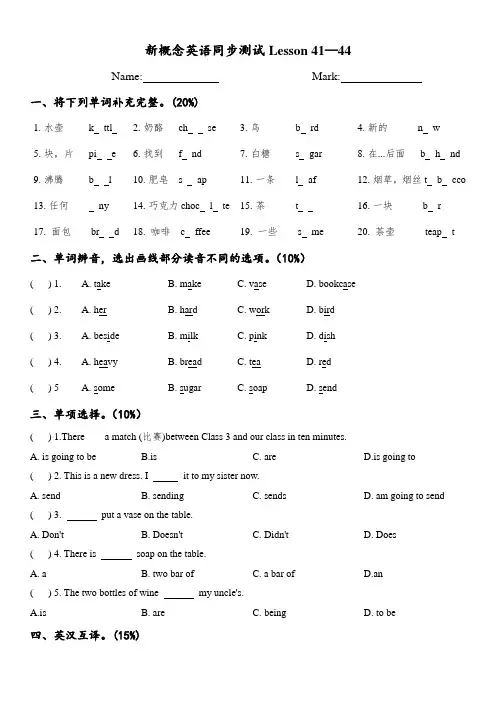
新概念英语同步测试Lesson 41—44Name: Mark:一、将下列单词补充完整。
(20%)1.水壶k ttl2.奶酪ch se3.鸟 b rd4.新的n w5.块,片pi e6.找到 f nd7.白糖s gar8.在...后面 b h nd9.沸腾 b l 10.肥皂s ap 11.一条l af 12.烟草,烟丝t b cco 13.任何ny 14.巧克力choc l te 15.茶t 16.一块 b r17. 面包br d 18. 咖啡 c ffee 19. 一些s me 20. 茶壶teap t二、单词辨音,选出画线部分读音不同的选项。
(10%)( ) 1. A. take B. make C. vase D. bookcase( ) 2. A. her B. hard C. work D. bird( ) 3. A. beside B. milk C. pink D. dish( ) 4. A. heavy B. bread C. tea D. red( ) 5 A. some B. sugar C. soap D. send三、单项选择。
(10%)( ) 1.There____a match (比赛)between Class 3 and our class in ten minutes.A. is going to beB.isC. areD.is going to( ) 2. This is a new dress. I it to my sister now.A. sendB. sendingC. sendsD. am going to send ( ) 3. put a vase on the table.A. Don'tB. Doesn'tC. Didn'tD. Does( ) 4. There is soap on the table.A. aB. two bar ofC. a bar ofD.an( ) 5. The two bottles of wine my uncle's.A.isB. areC. beingD. to be四、英汉互译。
新概念英语第四册第41课:Training elephants Lesson 41 Training elephants训练大象First listen and then answer the following question.听录音,然后答复以下问题。
At what point does the training of a captive wild elephant beginTwo main techniques have been used for training elephants, which we may respectively the tough and the gentle. The former method simply consists of setting an elephant to work and beating him until he does what is expected of him. Apart from moral considerations this is a stupid method of training, for it produces a resentful animal who at a later stage may well turn man-killer. The gentle method requires more patience in the early stages, but produces a cheerful, good-tempered elephant who will give many years of loyal service.驯象有两种主要的方法,我们分别称之为强硬法和温柔法。
强硬法就是驱象去干活,把它打顺从为止。
且不说道义问题,这本身就是一种愚蠢的训练方法,因为这种方法训练会使动物反感,在以后某个时期可能会变成伤人的动物。
Lesson 41 单词讲解1. cheese: 奶酪笑音\ i:\ Say cheese!2. bread: 面包3. soap: 肥皂soup 汤4. chocolate: 巧克力5. sugar: 糖(白砂糖)candy,糖果sugar coat?Can you sugar coat a little?你可以稍微委婉一点吗?6. coffee: 咖啡7. tea: 茶8. tobacco: 烟草cigarette 香烟Lesson 41 课文讲解1. Not very. 不是非常…It is not very heavy.2. What’s in it?What’s on \ under \ over \ behind it?3. 量词:a piece of…一片、一块的…a loaf of…一个、一条的…a bar of…一条、一块的…a bottle of…一瓶的…a pound of…一磅的…a tin of…一罐的…a cup of… a box of…a spoon of…4. pound:A. £英镑one pound \ two poundspenny: 便士,one penny \ two pence五角≈fifty pencedollar: $美元one dollar \ two dollarscent: 美分,one cent\ two centsB. a pound: 一磅one pound ≈ 0.454 kilogram(千克\ 公斤)a pound of cheese: 一磅奶酪Her weight is under ninety pounds.她的体重不足90 磅。
(90 磅≈40.86 公斤)半磅:half a pound of..四分之一磅:a quarter of a pound of…Lesson 41 语法讲解名词1. 冠词+名词2. 名词所有格:‘s \ of3. 单&复数4. 可数&不可数不可数名词1. 概念:不可以数的、不可以计算的名词;2. 包括:A. 液体状的东西;water\ tea\ coffee\ milk\ beer…B. 物质名词;soap\ bread\ chocolate\ rice\ toba cco…C. 抽象名词. love\ friendship\ work\ homework…3. 用法:A. 前面不可以加one, two, three…B. 前面不可以加a\an;C. 后面不可以加s,永远是单数。
Lesson41-42课堂总结1.本次课学习内容课文Lesson39-40重点单词检查默写一课一练Lesson39-40检查&批改课文Lesson41-42讲义精讲及拓展课文背诵,PK2.本次作业:每天听读课文lesson41-423~4遍并背诵复习当天的讲义&课堂笔记,牢记重点词汇,短语完成一课一练,牢记重点词汇,短语课堂表现:姓名朗读成绩:一课一练完成情况单词默写成绩课文默写成绩课文背诵情况一课一练&默写错误单词和词组课堂PK情况Team得分:TeamATeamBLesson41-42课堂笔记词汇详解:1.Cheeseketchup番茄酱,soy sauce酱油,pepper胡椒粉2.Bread一片面包a piece of bread拓展:toast吐司sliced bread切片面包croissant羊角面包3.Soap一块肥皂:a bar/cake of soap4.Chocolate一(大)块巧克力:a(large)bar of chocolateMy favourite chocolate is....,because...I like...chocolate best...,because...black chocolate,nut chocolate,whiskey heart chocolate,white chocolate 酒心5.Sugar一勺糖:a spoonful of sugar拓展:白砂糖:white sugar红糖:brown sugar冰糖:crystal/rock sugar糖浆:syrup6.Coffee一杯咖啡:a cup of coffee 纯咖啡:black coffee7.Teae.g.一杯茶a cup of tea 拓展:红茶:black tea绿茶:green tea奶茶:milk(y)tea8.Tobacco一听烟草:a tin of tobacco 平常抽的烟叫:cigarette 雪茄:cigar9.Bird拓展:麻雀:sparrow乌鸦:crow鸽子:dove鹦鹉:parrotcanary,lark,flamingo,nightingale10.Anye.g.——你有钱吗?——我没有钱11.Somee.g.Would you like____coffee?somee.g.Could you give me_____money?some语法:a bar ofa loaf ofa bottle ofa pound ofhalf pound ofa quarter of a third of a can of/a tin of。
新概念英语第三册第41课:Illusions of Pastoral peace Lesson 41 Illusions of pastoral peace宁静田园生活的遐想Listen to the tape then answer the question below.听录音,然后答复以下问题。
What particular anxiety spoils the country dweller s visit to the theatreThe quiet life of the country has never appealed to me. City born and city bred. I have always regarded the country as something you look at through a train window, or something you occasional visit during the weekend. Most of my friends live in the city, yet they always go into raptures at the mere mention of the country. Though they extol the virtues of the peaceful life, only one of them has ever gone to live in the country and he was back in town within six months. Even he still lives under the illusion that country life is somehow superior to town life. He is forever talking about the friendly people, the clean atmosphere, the closeness to nature and the gentle pace of living. Nothing can be compared, he maintains, with the first cockcrow, the twittering of birds at dawn, the sight of the rising sun glinting on the trees and pastures. This idyllic pastoral scene is only part of the picture. My friend fails to mention the long and friendless winter evenings in front of the TV -- virtually the only form of entertainment. He says nothing about the poor selection of goods in the shops, or about those unfortunate people who have to travel from the country to the city every day to get to work. Why people are prepared to tolerate a four-hour journeyeach day for the dubious privilege of living in the country is beyond me. They could be saved so much misery and expense if they chose to live in the city where they rightly belong.If you can do without the few pastoral pleasures of the country, you will find the city can provide you with the best that life can offer. You never have to travel miles to see your friends. They invariably live nearby and are always available for an informal chat or an evening s entertainment. Some of my acquaintances in the country come up to town once or twice a year to visit the theatre as a special treat. For them this is a major operation which involves considerable planning. As the play draws to its close, they wonder whether they will ever catch that last train home. The cit dweller never experiences anxieties of this sort. The latest exhibitions, films, or plays are only a short bus ride away. Shopping, too, is always a pleasure. The latest exhibitions, films, or plays are only a short bus ride away. Shopping, too, is always a pleasure. There is so much variety that you never have to make do with second best. Country people run wild when they go shopping in the city and stagger home loaded with as many of the exotic items as they can carry. Nor is the city without its moments of beauty. There is something comforting about the warm glow shed by advertisements on cold wet winter nights. Few things could be more impressive than the peace that descends on deserted city streets at weekends when the thousands that travel to work every day are tucked away in their homes in the country. It has always been a mystery to me who city dwellers, who appreciate all these things, obstinately pretend that they would prefer to live in the country.参考译文宁静的乡村生活从来没有吸引过我。
【导语】新概念英语作为家喻户晓的英⽂学习教材,《新概念英语》在中国经久不衰,影响了好⼏代学习者。
即使以今天的⾓度来看,这套出版于⼏⼗年前的教材⽆论是在编排体系,题材和题材,词汇还是语法上都有出彩之处,值得各个层次的⼈学习。
为您整理了以下内容,仅供参考。
希望可以帮助到您!如果您想要了解更多相关内容,欢迎关注!【篇⼀】Lesson 41【Multiple choice questions】 Comprehension 1 What is the main difference between the writer and most of his friends? a. they often visit the country but he has only spent one weekend there. b. Unlike them, being brought up in the city, he can appreciate its worth. c. In contrast to them, he finds city people friendlier than country people.d. He thinks them hypocritical to maintain a preference for country life. 背熟 D 选项 think sb. hypocritical 认为某⼈很虚伪 maintain a preference for sth. 坚持⼀种想法 2 What advantage has the city dweller over the country dweller in terms of entertainment?(背熟) a. He can entertain his country friends more often than they can him. b. His choice of entertainment is wide and within easy reach of him. c. As he travels by bus and not by train, he can see the latest plays.d. He does not need a major operation when planning a visit to the theatre. in terms of have advantage over sb./ sth. ⽐ ......更具有优势 背熟 within easy reach of sb. ⽅便,容易达到 3 When he speaks of the beauty to be found in the city, the writer ____ . a. alludes to the comparative cheerlessness of winter nights in the country b. means that if more people settled in the city they would find peace c. advertises the fact that the city is a warmer place than the country d. implies that the country is less peaceful than the city at weekends 背熟 allude to = mean Structure 4 I _____ and bred in the city and have always regarded … (ll.1-2)a. being bornb. had been bornc. was bornd. am born 5 He _____ talking about the friendly people … (ll.8-9)a. never tires ofb. is never tiring ofc. is never tiredd. is never tiring when tire of 厌倦 never 频度副词,表⽰情况总是如此 I am tired of doing so. 我已经厌倦了这么做。
Lesson 41 Do you call that a hat?首先,我们检查一下课文的背诵和生词的默写。
接下来我们来重点讲解课文。
1.Do you call that a hat?“Do you call that +(冠词)+名词”这个结构可以表达一种轻蔑的含义,比如说:Do you call that a house/a dog? 你把那个叫房子/狗吗?2.无理①You shouldn’t be so rude about it这句中,rude是一个adj.,无礼的,强调故意的;而我们学过的impolite 也可表示不礼貌,但它强调没有注意到礼节性的问题, 所以显得有些不礼貌(另外,polite 的反义词,以p 开头的形容词的否定前缀为im);下面我们再介绍一个单词:cheeky adj. 无礼, 没礼貌的它是强调表示小孩对长辈无理,比如说Don’t be cheeky! 不得无礼!②be rude about sth. 对事很粗鲁be rude to sb. 对人很粗鲁eg: Don't be rude to me. 别对我这么粗鲁eg: There is a nice garden _______ the house.Helen sits _______ the bus.eg: There is a book ____ the desk.The sign ____ the door says” Mind your head”.Mr Lee lives on the top floor ____ us.4. mirror①look at oneself in the mirror 照镜子eg: She looked at oneself in the mirror and saw her __________.A. reflectionB. idolC. imaginationD. picturereflection译为映象、反映,强调原来是怎样现在就怎样反映;idol是幻象、偶像,只看到的不真实,是假的,比如说海市蜃楼是一种幻象;imagination指想象,强调完全不存在,没有看到,只是凭空想象。
look up sth. in the dictionary 查字典②mirror of……的写照,…的真实反映His novel is a mirror of his time. 他的小说就是他那个时代的真实写照5. I sat down on one of those modern chairs with holes in it and waited.①with holes in it 作定语eg. Jane put a piece of paper with her name and address on it into a bottle.译:加上柠檬和糖会非常美味。
_______________________________________________________②hole n. 孔hole in+地点……(地方)有个洞6. Remark, Observe and Noticeremark与observe都可以表示“说,评论说”,它们比say要正式:You’re looking very well!’She remarked/observed.notice 和observe 都可以表示“注意到,察觉到”,都是感官动词,但有一定区别。
notice 指无意中“察觉到”;observe则可以指有意观察、仔细地看,比notice更正式:He observed me carefully. (He looked at me.) 他仔细地看着我.Did you notice how she was dressed? 你注意到她的穿戴了吗?I’ve noticed/observed that he telephones her oftener than before.我发现/注意到他现在给她打电话比以前次数多了。
7. regret(I regretted saying it almost at once.)①regret doing sth./名词/that从句后悔已经做了某事,表示对做过的事感到遗憾eg : Did he regret his mistake?I now regret leaving my country/that I have left my country.②regret to do sth. 表示对现在或将来要做的事感到对不起、遗憾,比be sorry to do sth.要正式:We regret to tell you that you are not welcome. 我很遗憾地告诉您,您不受欢迎。
eg: I regret _________ more time with my grandma before she passed away.A. not to spendB. to not spendC. not spendingD. hadn’t spendeg: I regret _________ that you’ve failed the French test.A. tellingB. having toldC. to tellD. to be told8. 'You needn't have said that,' my wife answered. 'I needn't remind you of that terrible tie you bought yesterday.'①needn't have done 原本不必做, 但是做了, 强调过去的动作不必做needn't do 现在的动作也不必做eg: You needn't have said that. 原本不必说,但已经说了。
I needn't remind you…原本不必提醒,现在或将来可能会提醒。
eg: You needn't have bought it. 你原本不必买的(但已经买了)You needn't buy it. 你不必买(还未买,将来可能买。
试分析下面两句:You needn’t come. ___________________________________________You needn’t have come. ____________________________________________________9. remind①vt. 使……想起reminder n. 提醒物remind sb. of sth.让某人回想起做(过)某事The smell of cabbage reminds me of school. 卷心菜的气味使我想起了学校。
She reminds me of her sister. 她让我想起了她妹妹②vt. 提醒remind sb to do sth 提醒某人去做某事(未做过)③remind sb + that从句eg: He reminded his wife that they needed to buy some coffee and sugar.他提醒他的老婆他们需要买一些咖啡和糖10.I find it beautiful动词find经常用于“动词+宾语+宾语补足语”这种结构:You’ll find it difficult/easy to make conversation with her.I find this book very interesting.eg: I find ________ interesting to read foreign literatures.A. it’sB. thatC. that’sD. it11.A man can never have too many ties.can never…too…=cannot…too…无论……也不为过A man can never have too many ties.再多的领带对一个男人来说也不为过(男人有多少领带也不会嫌多)。
eg: I can never thank you too much. 感激不尽。
Drinking water can never be too clean. 饮用水越干净越好。
译:一个漂亮的妻子怎么罗嗦也不为过。
____________________________________________________译:你过马路时越小心越好。
___________________________________________________12.Must, Have (got) to and Need①情态动词表虚拟情态动词must(必须,不得不)的否定式mustn't(不能、不准),must 还可用于表示推测:对现在和将来的推测:must +动词用原形对正在发生的事情的推测:must be doing对过去的推测:must have done对过去正在发生的事情的推测:must have been doing②情态动词的否定用must 的一般疑问句可以用must/have to或needn’t 来回答,而不用mustn’t:eg: Must I set off now?---Yes, you must / have to.--- No, you needn’t.mustn’t表示绝对禁止,在说话人看来,根本没选择余地:eg: You mustn’t use that bicycle. It’s broken.“不必要”可用needn’t,don’t have to来表示:needn’t = don’t have to,needn’t have done = didn’t have toeg: You needn’t / don’t have to work such long hours.③need的两种词性英语中的need 有两种词性,一个是普通动词(需要),一种是情态动词。
need 的否定形式对应也有两种:needn't 不必(情态动词need的否定);don't need 不需要(普通动词need 的否定)。
need I do...?(情态) / do I need to do...? (实义动词)eg: Need I go out? = Do I need to go out? 我需要出去吗?You needn’t have told me that. I know it is.注:情态动词后面不能直接用名词做宾语,实义动词后面可以直接加名词, 故need 后面如是名词, 则这个need 为实义动词eg: He________ follow me .A. doesn’t needB. needn’t toC. didn’t need toD.needs注:情态动词need后接动词原形,但只用于否定和疑问句,肯定句用must,have to,ought to或should。